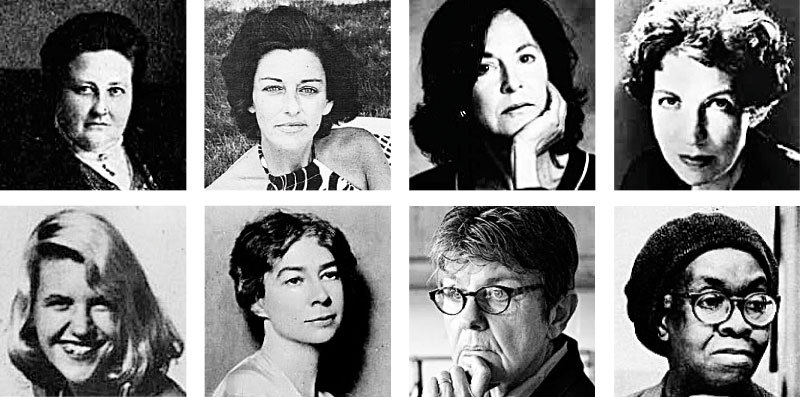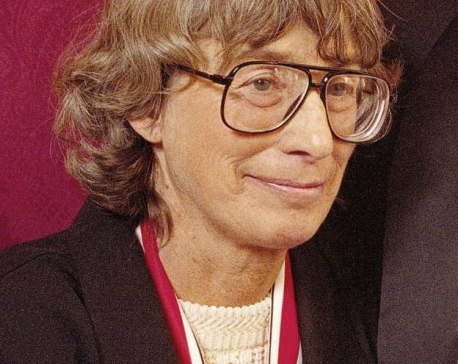
OR

KATHMANDU, Sept 9: Poetry is a great form of art to express oneself and paint what simple words cannot convey into feelings and ideas. Pulitzer Award for Poetry is a respectable award presented to poets of the highest caliber. Presented here are some of the most influential and amazing female poets in the history of Pulitzer.
Sara Teasdale
(Love Songs, 1918)
Sara Teasdale received public admiration for her well-crafted lyrical poetry that centered on a woman’s changing perspectives on beauty, love, and death. Teasdale’s work had always been characterized by its simplicity and clarity, her use of classical forms, and her passionate and romantic subject matter. These later books trace her growing finesse and poetic subtlety. It is sad that the very same passion undoubtedly led to commit suicide in early 1933. She wrote mainly of love, nature, and death, but of course “Love Songs” which was published in 1917 focused on love, though the other major themes are sometimes also there.
Amy Lowell
(What’s O’Clock, 1926)
Lowell, a vivacious and outspoken businesswoman, tended to excite controversy. She was deeply interested in and influenced by the Imagist movement, led by Ezra Pound. The primary imagists were Pound, Ford Madox Ford, H.D. , and Richard Aldington. This Anglo-American movement believed, in Lowell’s words, that “concentration is of the very essence of poetry” and strove to “produce poetry that is hard and clear, never blurred nor indefinite.” Lowell campaigned for the success of imagist poetry in America and embraced its principles in her own work. She acted as a publicity agent for the movement, editing and contributing to an anthology of imagist poets.
Gwendolyn Elizabeth Brooks
(Annie Allen, 1950)
She grew up in the slums of Chicago and lived in that city until her death. Brooks’s poems, technically accomplished and written in a variety of forms including quatrains, free verse, ballads, and sonnets, deal with the experience of being black and often of being female in America. She attracted critical attention with her first volume, A Street in Bronzeville (1945). Brooks went on to win the 1950 Pulitzer Prize for poetry for Annie Allen (1949), becoming the first black woman to win this award. She also received an American Academy of Arts and Letters award.
Phyllis McGinley
(Times Three: Selected Verse from Three Decades, 1961)
McGinley was educated at the University of Southern California and at the University of Utah in Salt Lake City. After receiving her diploma in 1927, she taught for a year in Ogden and then at a junior high school in New Rochelle, New York. Once she had begun to establish a reputation for herself as a writer, McGinley gave up teaching and moved to New York City, where she held various jobs. Phyllis McGinley was an American writer of children’s books and poet about the positive aspects of suburban life. She also wrote the lyrics for a musical revue, Small Wonder, in 1948.
Anne Sexton
(Live or Die, 1967)
The daughter of a successful businessman, Sexton’s childhood was materially comfortable but not happy. Her relationships with her parents were difficult, perhaps even abusive. Sexton suffered from post-partum depression, and after the birth of her first daughter she suffered her first breakdown and was admitted to a neuropsychiatric hospital. Sexton is seen as the modern model of the confessional poet. Aside from the standard themes of depression, isolation, suicide, and despair, her work also encompasses issues specific to women, such as menstruation and abortion — and more broadly, masturbation and adultery — before such subjects were commonly addressed in poetic discourse.
Sylvia Plath
(The Collected Poems, 1982)
Sylvia Plath was one of the most dynamic and admired poets. By the time she took her life at the age of 30, Plath already had a following in the literary community. Sylvia Plath married Ted Hughes and had a stormy relationship. After Hughes left her for another woman in 1962, Plath fell into a deep depression. Struggling with mental illness, she wrote The Bell Jar which was based on her life. Plath published the novel under the pseudonym Victoria Lucas. She created the poems that would make up the collection Ariel, which was released after her death on February 11, 1963.
Louise Gluck
(The Wild Iris, 1993)
From her first book of poetry, Firstborn, Glück was internationally recognized as a very skilled, perceptive author who pulls the reader into her poetry and shares the poetic experience equally with her audience. Glück has also published a collection of essays, Proofs and Theories: Essays on Poetry (Ecco Press, 1994), which won the PEN/Martha Albrand Award for Nonfiction. Her honors include the Bollingen Prize in Poetry, the Lannan Literary Award for Poetry, a Sara Teasdale Memorial Prize, the MIT Anniversary Medal and fellowships from the Guggenheim and Rockefeller Foundations, and National Endowment for the Arts.
Kay Ryan
(The Best of It: New and Selected Poems, 2011)
Born in California in 1945 and acknowledged as one of the most original voices in the contemporary landscape, Kay Ryan is the author of several books of poetry, including Flamingo Watching (2006), (2005), and Say Uncle (2000). Her book The Best of It: New and Selected Poems (2010) won the Pulitzer Prize for Poetry. Ryan’s tightly compressed, rhythmically dense poetry is often compared to that of Emily Dickinson and Marianne Moore; however, Ryan’s often barbed wit and unique facility with “recombinant” rhyme has earned her the status of one of the great living American poets, and led to her appointment as U.S. Poet Laureate in 2008.
(Compiled by Reya Shreya Rai)
You May Like This

A three-day int’l literature festival kicks off in capital
KATHMANDU, Dec 28: A three-day International Literature Festival kicked off in the capital on Thursday. ... Read More...

Pulitzer Prize-winning poet Mary Oliver dies at 83
Mary Oliver, the Pulitzer Prize-winning poet whose rapturous odes to nature and animal life brought her critical acclaim and popular... Read More...

The Times and The New Yorker Share the Pulitzer Prize for Public Service
April 17: Pulitzer Prizes were awarded on Monday to the news organizations that drove two of the biggest stories of... Read More...





Just In
- MoHP cautions docs working in govt hospitals not to work in private ones
- Over 400,000 tourists visited Mustang by road last year
- 19 hydropower projects to be showcased at investment summit
- Global oil and gold prices surge as Israel retaliates against Iran
- Sajha Yatayat cancels CEO appointment process for lack of candidates
- Govt padlocks Nepal Scouts’ property illegally occupied by NC lawmaker Deepak Khadka
- FWEAN meets with President Paudel to solicit support for women entrepreneurship
- Koshi provincial assembly passes resolution motion calling for special session by majority votes






_20220508065243.jpg)






Leave A Comment